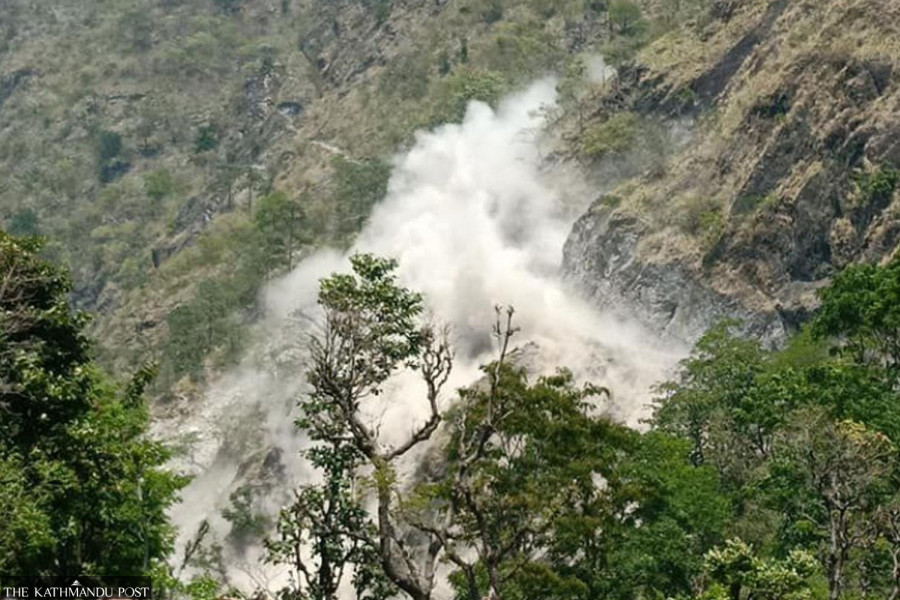
India has sought an ‘end use certificate’ from Nepal to provide explosives for the construction projects in the country. Officials said this is intended to control the supply of explosives to the projects funded by China or those involving Chinese contractors.
After various roads and hydropower projects, particularly those involving Chinese contractors faced a shortage of explosives, Nepal had called for a prompt supply from India during the 10th joint secretary-level Joint Working Group and the secretary-level Joint Steering Committee held in Jaipur, India on February 17-18.
“They also raised the issue of end users’ certificates while also assuring us that they will take the Nepali side’s concerns to the agency responsible for dealing with explosives,” said a member of the Nepali delegation on condition of anonymity. “They said that they are concerned about possible misuse of explosives.”
As per the Working Procedure on Import, Transport, Storage and Use of Explosives-2017, the import, transport, and storage of explosives for industrial and construction projects should be carried out under strict vigilance of the Nepal Army.
“It should also be used in the presence of either the Nepal Army, the Armed Police Force or the Nepal Police [personnel],” the working procedure states.
“We have to arrange a housing facility for at least 35 army personnel and a bunker too. They get involved in the supply of explosives even at the construction site,” a developer of a hydropower project told the Post.
Despite such provision, the southern neighbour has raised the issue of end-user certificate, which prompted Nepali officials to speculate that the measure is aimed at projects with Chinese involvement.
Even though the Nepal Army has been producing commercial explosives from its Sunchari Emulsion Plant established at Sunachari of Makawanpur district, it does not produce enough for all the country’s infrastructure projects.
“Our production is inadequate. That’s why the explosives are being imported for the construction projects,” said Nepal Army spokesperson Brigadier General Krishna Prasad Bhandari.
India has sought issuance of ‘end use certificate’ at a time when a number of construction projects in Nepal are complaining about the shortage of explosives.
Officials and the private sector people involved in infrastructure projects said that the southern neighbour has been denying or delaying the supply of explosives meant for projects where there is the involvement of Chinese investors or contractors.
It is in line with the Indian government’s policy of not buying electricity from the projects where there is involvement of Chinese elements. For example, India is yet to approve the 456MW Upper Tamakoshi Hydropower Project to export power to India citing the involvement of a Chinese contractor in its civil works, according to officials of the Nepal Electricity Authority.
This is a project developed with complete domestic funding and Nepal has been making a lot of effort with India to get its approval for power export to the southern neighbour.
In an apparent move to discourage Chinese involvement in infrastructure projects in Nepal, India has been adopting a number of tactics given Nepal’s reliance on India for the supply of many essential goods, Nepali officials and private sector actors said.
The Indian embassy has been delaying to issue a ‘No Objection Letter’ for the supply of explosives if they are intended for projects with Chinese elements, a licensed supplier of explosives for construction projects told the Post on condition of anonymity.
The Post contacted the Indian Embassy in Kathmandu to understand the matter but received no response. Given bad relations between India and China owing to a series of border skirmishes in recent years, the southern neighbour has barred Chinese investment in a number of sectors within India too.
Officials and those in the private sector said that a number of road projects have also been affected by the explosives shortage. “India does not give explosives for projects with Chinese involvement,” said a former senior official of the Department of Roads. “That’s why, a number of projects were affected including the widening of the Prithvi Highway where a Chinese contractor is involved.”
Rabi Singh, president of Contractors’ Association of Nepal, said that the shortage of explosives has emerged as one of the major problems for construction projects. “We have to wait for 6-8 months to get them,” he said.










